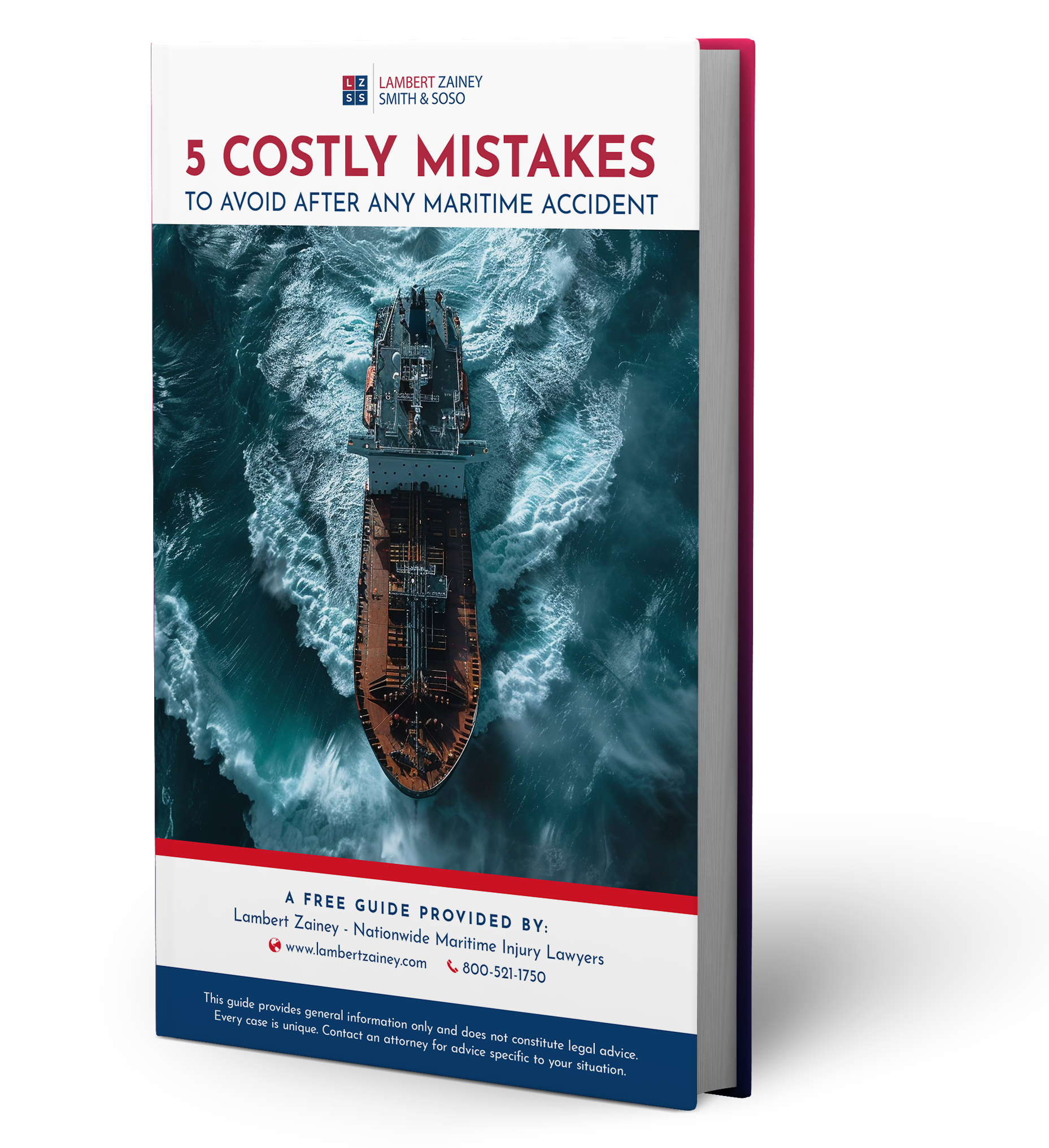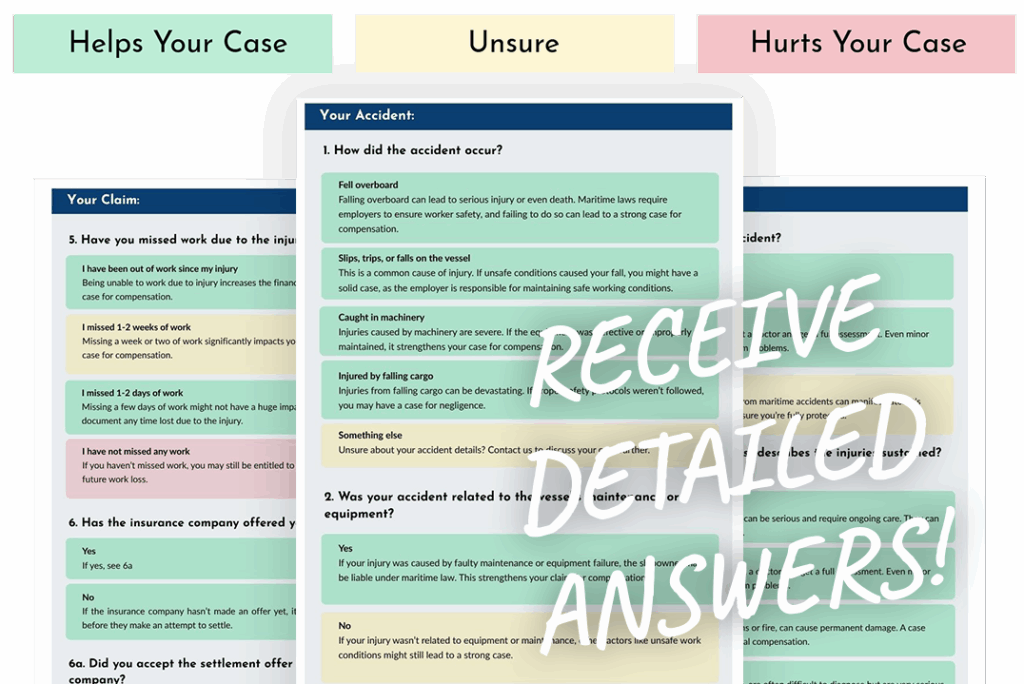The Jones Act, Longshore and Harbor Workers’ Compensation Act (LHWCA), and other maritime laws provide disability benefits to maritime workers who have been injured on the job. If you’re a maritime worker, you probably already know that you may be able to collect disability compensation for your medical expenses (cure) and lost wages (maintenance). However, did you know that you may also qualify for vocational training and other benefits if you must change careers after a maritime injury because you are unable to return to your previous job?

Did Your Maritime Injury Necessitate a Change in Careers?
When a maritime worker is injured in an on-the-job accident, they generally experience three possible outcomes:
If you’re a part of the latter group, you may be wondering what your next career move is. The important thing is to keep a positive outlook. A lot of the skills and experience you learned working in the maritime industry can be applied to many occupations.
Vocational Rehabilitation Under the LHWCA, Jones Act, and Other Maritime Laws
Depending on your circumstances, you may qualify for vocational rehabilitation and other benefits provided by the LHWCA, Jones Act, and other maritime laws.
The LHWCA provides vocational rehabilitation benefits for qualified workers. LHWCA vocational services can include vocational assessment and skills testing, job counseling, job development, modification of their previous job description, job training, and job placement assistance.
The Jones Act allows injured seamen to file personal injury claims against employers in cases where their injuries resulted from the unseaworthiness of the vessel they were serving aboard. In addition to ongoing medical expenses, lost wages, pain, and suffering, injured seamen may also claim vocational rehabilitation damages.
Speaking with a maritime attorney is always a good idea after you’ve suffered an on-the-job accident. Depending on your circumstances, you may be able to get assistance after unexpected career changes due to your maritime injury. The maritime accident attorneys at Lambert, Zainey, Smith & Soso are available to answer any legal questions you may have about your maritime injuries and the compensation and benefits available to you.
Get Our FREE Guide to Protect Your Claim
What you do after an accident is critical. Insurance companies will try to get you to make mistakes that can hurt your claim. Our free guide can help you avoid these traps.
Download our complimentary guide: “5 Costly Mistakes to Avoid After Any Maritime Accident” to arm yourself with the knowledge you need to protect your rights.
Lambert, Zainey, Smith & Soso is Here to Help You After a Maritime Accident
No one plans on changing careers due to a work-related accident. If you’ve been injured while working in the maritime industry due to the negligence of a coworker or employer, it’s important to protect your rights to ensure you get the total compensation for the damages caused by your injuries, potentially including vocational training to help you find a new career if you are unable to return to your old job.
Lambert, Zainey, Smith & Soso is here to protect your rights as an injured maritime worker. We’ve been representing workers injured in maritime accidents all over the U.S. since the 1970s. Our maritime injury lawyers have obtained hundreds of millions of dollars in settlements for our clients.
Contact Lambert, Zainey, Smith & Soso via our website or call us at (504) 581-1750 today to discuss your maritime personal injury claim. We handle maritime injury claims on a contingency basis, which means there are no upfront costs to our clients, and we don’t collect a fee until after you collect your settlement.
The Jones Act, Longshore and Harbor Workers’ Compensation Act (LHWCA), and other maritime laws provide disability benefits to maritime workers who have been injured on the job. If you’re a maritime worker, you probably already know that you may be able to collect disability compensation for your medical expenses (cure) and lost wages (maintenance). However, did you know that you may also qualify for vocational training and other benefits if you must change careers after a maritime injury because you are unable to return to your previous job?

Did Your Maritime Injury Necessitate a Change in Careers?
When a maritime worker is injured in an on-the-job accident, they generally experience three possible outcomes:
If you’re a part of the latter group, you may be wondering what your next career move is. The important thing is to keep a positive outlook. A lot of the skills and experience you learned working in the maritime industry can be applied to many occupations.
Vocational Rehabilitation Under the LHWCA, Jones Act, and Other Maritime Laws
Depending on your circumstances, you may qualify for vocational rehabilitation and other benefits provided by the LHWCA, Jones Act, and other maritime laws.
The LHWCA provides vocational rehabilitation benefits for qualified workers. LHWCA vocational services can include vocational assessment and skills testing, job counseling, job development, modification of their previous job description, job training, and job placement assistance.
The Jones Act allows injured seamen to file personal injury claims against employers in cases where their injuries resulted from the unseaworthiness of the vessel they were serving aboard. In addition to ongoing medical expenses, lost wages, pain, and suffering, injured seamen may also claim vocational rehabilitation damages.
Speaking with a maritime attorney is always a good idea after you’ve suffered an on-the-job accident. Depending on your circumstances, you may be able to get assistance after unexpected career changes due to your maritime injury. The maritime accident attorneys at Lambert, Zainey, Smith & Soso are available to answer any legal questions you may have about your maritime injuries and the compensation and benefits available to you.
Get Our FREE Guide to Protect Your Claim
What you do after an accident is critical. Insurance companies will try to get you to make mistakes that can hurt your claim. Our free guide can help you avoid these traps.
Download our complimentary guide: “5 Costly Mistakes to Avoid After Any Maritime Accident” to arm yourself with the knowledge you need to protect your rights.
Lambert, Zainey, Smith & Soso is Here to Help You After a Maritime Accident
No one plans on changing careers due to a work-related accident. If you’ve been injured while working in the maritime industry due to the negligence of a coworker or employer, it’s important to protect your rights to ensure you get the total compensation for the damages caused by your injuries, potentially including vocational training to help you find a new career if you are unable to return to your old job.
Lambert, Zainey, Smith & Soso is here to protect your rights as an injured maritime worker. We’ve been representing workers injured in maritime accidents all over the U.S. since the 1970s. Our maritime injury lawyers have obtained hundreds of millions of dollars in settlements for our clients.
Contact Lambert, Zainey, Smith & Soso via our website or call us at (504) 581-1750 today to discuss your maritime personal injury claim. We handle maritime injury claims on a contingency basis, which means there are no upfront costs to our clients, and we don’t collect a fee until after you collect your settlement.









